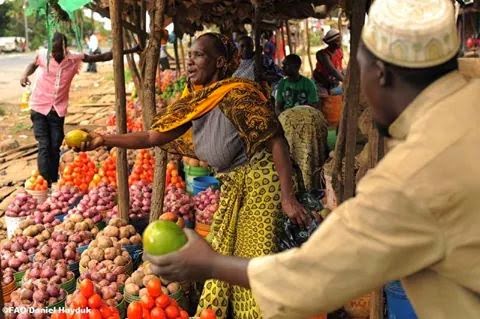Decent rural employment is defined as work that provides a living income and reasonable working conditions. It refers to productive and dignified work that enables people – whether self-employed or wage labourers – to provide for themselves and their families, while also ensuring their safety and health at work and providing them with opportunities to voice their concerns.
Promoting decent employment in rural areas is vital to effective rural poverty reduction. The lack of decent employment opportunities in rural areas is one of the main reasons why about 400 million workers continue to live in extreme poverty. Working long hours under bad and sometimes hazardous conditions, workers may suffer physical, financial and mental setbacks that can trap them in poverty.
Active support to countries in creating more and better jobs in agriculture and in rural areas is therefore central to FAO’s mission. FAO is helping countries to generate more productive farm and non-farm employment opportunities while also addressing the factors that undermine the well-being and productive potential of rural populations, including hazardous work, difficulties in accessing social protection, damaging child labour and discrimination against women.
FAO’s approach to promoting decent rural employment is built around four pillars:
• Changing the discourse: Development strategies often overlook the employment needs of the rural poor. FAO is working to close this underlying knowledge gap and lack of awareness through analysis and advocacy work that highlight the importance of decent employment in rural areas. FAO also identifies good practices in decent rural employment creation that can guide policymakers in their efforts to reduce rural poverty.
• Supporting governments: Many governments struggle to effectively promote decent employment in rural areas. To remedy this, FAO strengthens governments’ capacities to formulate, implement and monitor policies, strategies and programmes that enhance decent rural employment. For example, FAO helps governments integrate youth aspects into agricultural investment strategies and programmes, and supports them in extending the application of International Labour Standards to rural areas, including through the development of action plans to prevent and reduce child labour in agriculture.
• Empowering rural workers and entrepreneurs: FAO promotes innovative practices that enhance the capabilities of the rural poor – particularly women and youth – to improve their access to employment opportunities. FAO then supports governments to take ownership and scale up successful pilot projects and adapt tools and methodologies to local conditions and needs. For instance, FAO’s Junior Farmer Field and Life Schools (JFFLS) methodology has been successful in providing young women and men with the agriculture, business and life skills needed to earn a decent living and set up viable agro-enterprises.
• Developing partnerships: FAO partners with UN, regional, national and community-level stakeholders to promote decent rural employment. For example, FAO is strongly involved in the International Partnership for Cooperation on Child Labour in Agriculture, and collaborates closely with the International Labour Organization to promote the Global Employment and Decent Work Agenda in agriculture and rural areas.
Source: FAO

No comments:
Post a Comment